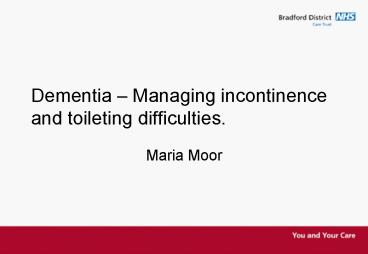Dementia PowerPoint PPT Presentation
1 / 24
Title: Dementia
1
Dementia Managing incontinence and toileting
difficulties.
- Maria Moor
2
What is dementia
- Broad term used to describe the symptoms of a
large group of illnesses that cause a progressive
decline in a persons mental functioning - It is a permanent and progressive disease that
eventually renders people incapable of looking
after themselves. - It is not a normal part of aging (common after
age of 65.
3
Symptoms
- Begins with forgetfulness
- Progresses to confusion and disorientation
- Effects problem solving
- Effects decision making
- Personality changes, irritable , agitated ,
depressed
4
Types Of Dementia
- Alzheimer's disease - this causes up to 60 of
cases of dementia. It is characterised by memory
loss and difficulties with language in its early
stages, - Vascular dementia - this is the consequence of
strokes and/or insufficient blood flow to the
brain and causes up to 20 of cases of dementia. - Dementia with Lewy bodies - this causes up to 15
of dementia cases and is characterised by
symptoms similar to Parkinson's Disease as well
as hallucinations, and a tendency to fall.
5
Other types of dementia
- Fronto temperal dementia ( group of dementias)
- Creutzfeldt Jakob disease occurs in 1 in 1
million. A rare and fatal brain disease - Aids related dementia
- Huntingtons Disease
- Alcohol related dementia
6
Dementia Incidence
- Approximately 600,000 people in the UK have
dementia. 5 of the total population aged 65 and
over, rising to 20 of the population aged 80 and
over. - Dementia can also occur before the age of 65
there are about 17,000 people with dementia in
younger age groups in the UK.
7
Incidence
- Of the people with dementia, 154,000 live alone .
It is estimated that by 2026 there will be
840,000 people with dementia in the UK, rising to
1.2 million by 2050. (Alzheimers Society 2011)
8
Treatment
- There are no cures as yet
- A group of drugs called acetyl cholinesterase
inhibitors may slow the progression of
Alzheimers dementia and Lewy Body dementia - Memantine, a glutamate blocker, may protect brain
cells against damage. - In Vascular dementia drugs may be of use in
slowing the damage to brain cells - Aspirin
- Medication to control high blood pressure
9
Dementia and Incontinence
- Incontinence is the loss of control of bladder
and bowel - Incontinence occurs in people with dementia for
many reasons - A decline in intellect and memory as a result of
dementia can result in incontinence
10
Causes of Incontinence
- Infection
- Constipation
- Medication
- Physiological bladder and bowel problems
- Prostate enlargement
- Vaginal Prolapse
11
Other causes due to changes in persons ability
- Inability to recognise toilet
- Inability to find the toilet
- Inability to recognise the need to go
- Inability to use the toilet
- Inability to communicate needs
- Inability to formulate words
- Mobility and Dexterity
12
Common occurring actions.
- Parcelling (eg wrapping and concealing the
evidence in drawers etc - Wetting or soiling clothes
- Wetting or soiling the bed
- Using an inappropriate receptacle
- Smearing
13
Other causes
- Depression
- Fear
- Embarrassment
14
Suggestions for managing toilet problems
- Ensure the floor and toilet are of sharply
contrasting colours. - Coax forward, help to aim. Sit down
- Shiny floor can be perceived as wet
- Use reflective tape to direct to the toilet
- Night lights
- Use pictures where possible
- Personalised toilet routine,music,raised seat,
grab rails
15
Use a raised Loo
16
Location of Toilets
17
Inconsiderate siting of commodes
18
Continued
- Clothing. Simplify clothing. Elastic waistbands,
Velcro. - Toilet. Music to calm them. Make sure toilet
securely fastened. Raised loo seat. Grab bars. - Toilet routine.
- Skin care. Prevent soreness
19
Continued
- Intake. Adequate fluids. Reduce caffeine
- High fibre diet
- Prevent constipation
- Exercise
- Effective Communication
20
Changes in Communication
- May have difficulty finding a word
- They may not make sense
- Cant understand what you are saying
- May ignore you
- Difficulty expressing emotion
21
Communication is key
- Communication is made up of three parts-
- 55 is body language
- 38 is tone and pitch
- 7 is the words we use
22
How we can help.
- Use short simple words
- Remain calm
- Non verbal clues.
- Do not rush them.
- Give them plenty of time
- Avoid competing noises
- Consistent approach
23
Respect the patient
- Losing control can be humiliating and
embarrassing and care givers need to be sensitive
to these feelings
24
- Thank you
- Any Questions?

